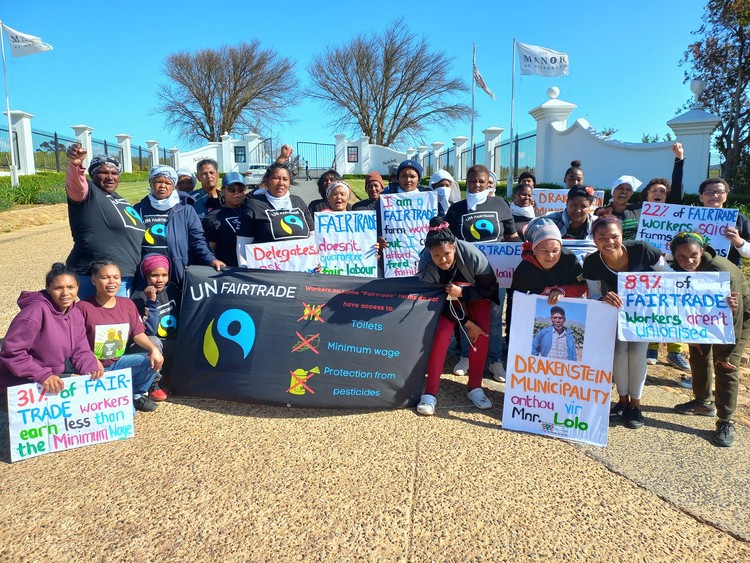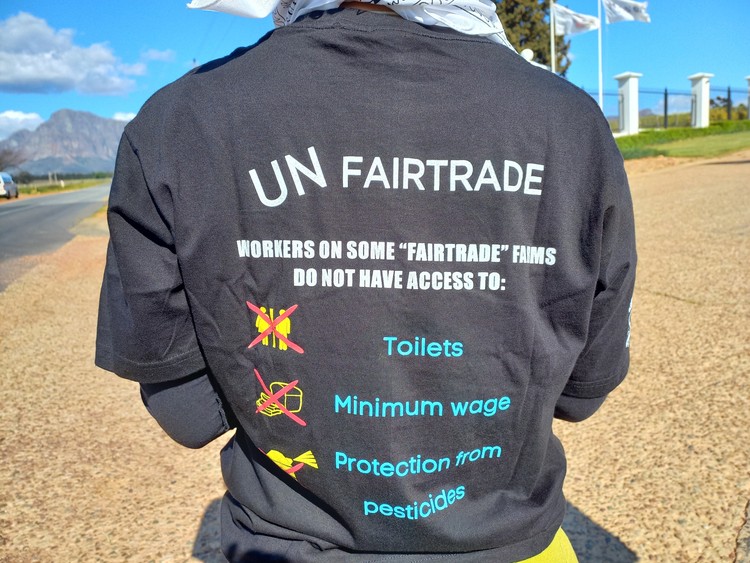Fairtrade suspends local producer over farm workers’ poor conditions
Women on Farms is calling for better policing of the Fairtrade standards on certified farms
Dozens of farm workers supported by Women on Farms members picketed outside the first ever International Fair Trade Towns Conference in Africa in Paarl last week to express their frustration over poor wages and living conditions for workers on farms. Photos: Marecia Damons
- Fairtrade has suspended the certification of a South African producer following serious allegations that its farm workers live in poor conditions.
- A report by Women on Farms found that 31% of surveyed workers on Fairtrade certified farms earn below the National Minimum Wage, and 93% of women do not earn a living wage, with many lacking basic facilities.
- Fairtrade said it has initiated measures to improve conditions.
Fairtrade International has announced that it has suspended the certification of a South African producer following serious allegations of its farm workers living in poor conditions.
This comes days after Drakenstein Municipality hosted the first ever International Fair Trade Towns Conference in Africa from 20 to 22 September. During the conference in Paarl last week, dozens of farm workers supported by Women on Farms members picketed outside, expressing their frustration over poor wages and living conditions for workers on farms.
Fairtrade-certified farms are meant to uphold international standards for fair working conditions. Some of these are that workers’ pay must be at least the minimum wage, that the right to collective bargaining is upheld, and that there is adequate housing.
Farmers and producers who are certified can usually export their goods at a higher price. The premium paid on Fairtrade-certified products is to be kept in a separate account and used to improve the conditions of workers and farmers.
While Fairtrade has been tight-lipped on revealing the name of the suspended local producer, the body told GroundUp that this was not the first time this producer had been found to be non-compliant.
“In 2022, when allegations of serious non-compliance in labour and living conditions for workers at Fairtrade certified vineyards in South Africa were made, Fairtrade acted immediately and treated them with the urgency and seriousness they deserved,” Fairtrade told GroundUp.
The body then conducted “a rights-based assessment and report on egregious violations to the appropriate national protection agency for further assessment and follow-up based on relevant and applicable law”.
After the allegations surfaced, FLOCERT, Fairtrade’s independent certifier, conducted its own audits that led to the suspension of the local producer until July 2023. As of September 2024, this producer was suspended again, Fairtrade said.
Fairtrade also referenced a study done by Women on Farms last year which also highlighted serious violations by certified producers and farmers in the wine industry. “We continued to act accordingly even though the specific names of farms and the associated allegations were not shared with Fairtrade,” the body said.
In 2023 Women on Farms published The Labour and Living Conditions of Workers on Fairtrade Certified Wine Farms in the Cape Winelands District Municipality, South Africa. It found that 31% of surveyed workers earn below the National Minimum Wage of R27.58. And most of the participants did not consider their earnings to be a living wage.
Women on Farms is calling for Fairtrade to impose harsher repercussions for certified farms and producers found to be non-compliant.
Compiled by researcher Celeste Fortuin, the study surveyed 50 women across 18 Fairtrade-certified farms and found that:
- 54% of women reported exposure to pesticides.
- 35% of women lacked toilet facilities at their work sites.
- 15% of women did not have access to safe drinking water.
These are “not reflected in the audits conducted by FLOCERT … because of inherent flaws in the auditing process and because of a culture of secrecy and intimidation on many Fairtrade-certified farms,” WFP stated.
The report also revealed that 73% of the women surveyed did not know how to report a Fairtrade violation, while 10% felt too intimidated to do so.
Denile Samuel, labour rights co-ordinator at Women on Farms, said: “Hopefully, we’ll be able to influence better policies and better policing of the Fairtrade standards. Hopefully, this will also be the start of getting Fairtrade-certified workers to speak out.”
In response to the issues raised by Women on Farms, Fairtrade said it had taken several measures over the past year-and-a-half to improve conditions for workers, including educating workers on available channels to report violations, and establishing the Precarious Work Committee to focus on issues faced by temporary and seasonal workers.
“Fairtrade Africa is exploring opportunities to lobby for better wages for workers. Two roundtable discussions were held with producers, workers, trade unions, and government,” the body said.
Fairtrade said that workers who deal with chemicals like pesticides are trained on how to safely handle chemicals and spraying equipment. They are given protective equipment and shown how to identify health issues.
“Fairtrade alone cannot solve all of the deeply entrenched challenges for women agricultural workers,” the organisation said. It urged all supply chain actors to work together to address challenges in South Africa’s wine sector.
Support independent journalism
Donate using Payfast

Next: Joburg’s temporary emergency accommodation policy a misstep
Previous: Coordinated attack on new Lottery board
© 2024 GroundUp. This article is licensed under a Creative Commons Attribution-NoDerivatives 4.0 International License.
You may republish this article, so long as you credit the authors and GroundUp, and do not change the text. Please include a link back to the original article.
We put an invisible pixel in the article so that we can count traffic to republishers. All analytics tools are solely on our servers. We do not give our logs to any third party. Logs are deleted after two weeks. We do not use any IP address identifying information except to count regional traffic. We are solely interested in counting hits, not tracking users. If you republish, please do not delete the invisible pixel.


